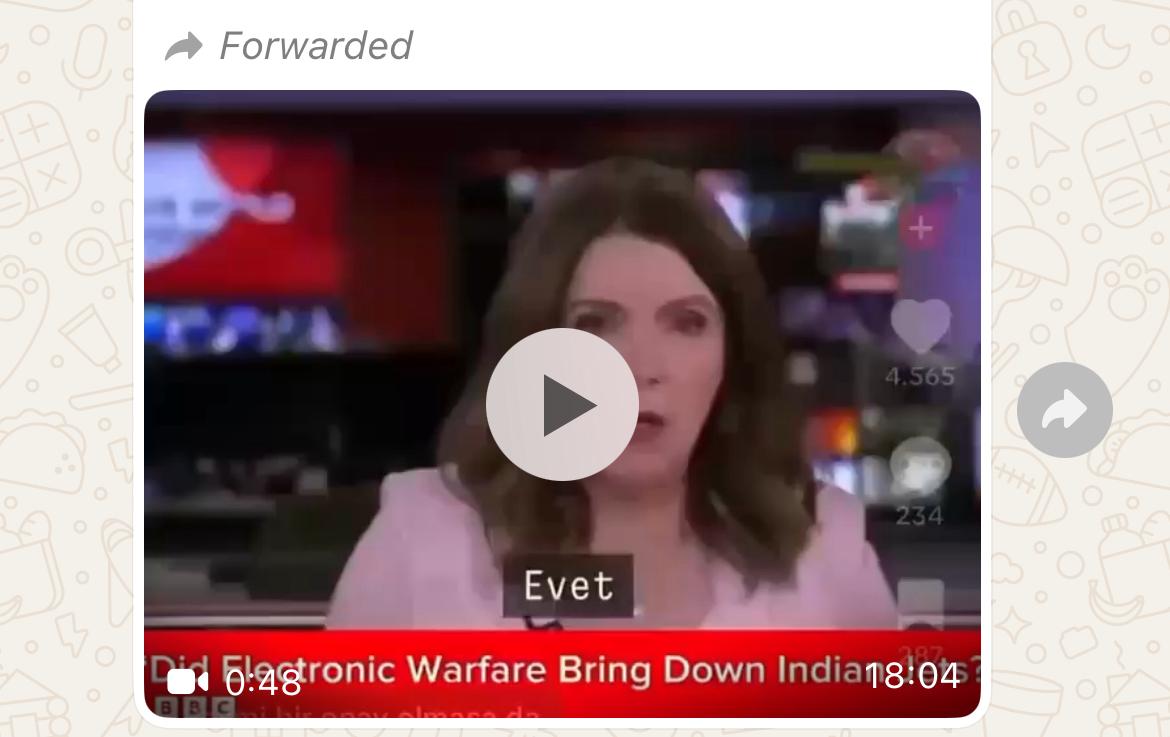
Claim: During a bulletin, BBC suggested that Pakistan may possess Turkey’s KORAL electronic warfare system.
Fact: The BBC’s broadcast news bulletin about Pakistan possessing Turkey’s KORAL electronic warfare system was not found on any official BBC channels. Moreover, the viral video’s audio was likely digitally altered.
X user @FarrukhJAbbasi shared a video (archive) of a BBC bulletin, writing, “BBC is suggesting Pakistan may have Turkey’s KORAL. If true, it means Pakistan jammed Indian electronics and destroyed Rafales. This is an interesting development.”
In the video, the newscaster says, “Yes. Tonight growing concerns in South Asia as multiple Indian air Force Rafael fighter jets have mysteriously crashed in rapid succession. While Indian officials cite technical malfunctions, eyewitness reports from the region suggest a far more complex picture. Locals claim mobile phones lost signal for hours, and electronic devices suddenly stopped working.” She further stated, “This has led some Indian defense analysts to suggest that Pakistan may be deploying advanced electronic warfare systems. According to these claims, the jets’ radar and electronic controls were jammed, possibly causing the crashes. And now, a bigger question is being raised. Did Turkey supply its Koral electronic warfare system to Pakistan? While there is no official confirmation, the speculation is gaining ground.”
It is important to note that this article is only fact-checking the video’s authenticity and not the claim about Turkey supplying KORAL to Pakistan or whether such a system was used in defensive measures in the early hours of 7 May.
Indian airstrikes in Pakistan
In the early hours of 7 May, the Indian military launched Operation Sindoor and targeted various locations inside Pakistan and Pakistan-administered Kashmir, killing at least 26 people and wounding 46 others, according to Pakistani authorities. At least three children were killed by the strikes.
The attacks marked the most expansive military action between the two nations since 1971.
Pakistan military’s media-wing Inter-Services Public Relations (ISPR) has said civilian areas in at least six locations — including Ahmedpur East, Muridke, Sialkot, Shakargarh, Kotli, and Muzaffarabad — were targeted.
India, however, alleged it targeted nine “terrorist camps”, a claim which has not yet been independently verified. Pakistan, on the other hand, has asserted that these sites are densely populated civilian areas. Emerging footage and on-ground reporting, including hospital reports, shows that civilians, including women and children, were injured in the attack, which lends credibility to Pakistan’s assertions that civilian areas were harmed, contrary to claims made by Indian officials. Soch Fact Check also independently confirmed deaths of several civilians in Bahawalpur, including two children.
Notably, military strikes in Pakistani Punjab are across a recognised international border and constitute a major escalation relative to the surgical strikes carried out along the Line of Control (LoC), the ceasefire line that divides Pakistan-administered Kashmir from Indian-administered Kashmir.
Pakistan’s Prime Minister Shehbaz Sharif condemned the airstrikes, saying his country “has every right to give a robust response to this act of war imposed by India”.
The Pahalgam Attack
India claims its strikes were a response to the terror attack in Pahalgam in Indian-administered Kashmir on 22 April, which killed 26 people, mostly tourists.
Indian officials linked the attack to Pakistan, but Islamabad has denied the claim. The Resistance Front – a group that Indian officials maintain is a proxy front for the Pakistan-based militant group Lashkar-e-Taiba (LeT) – initially claimed responsibility for that attack but later retracted its statement.
Pakistan demanded a neutral investigation, asserting that India has not provided any evidence to support its allegations of Pakistan’s involvement in the attack.
The Indus Waters Treaty
Soon after the attack on tourists in Pahalgam, New Delhi announced the suspension of the Indus Waters Treaty, which has been in place since 1960 and has survived two wars between the neighbouring nuclear countries. Pakistan stated that attempts to stop or divert Pakistan’s water would be considered an “act of war and responded with full force across the complete spectrum of national power”.
On Tuesday, after a UNSC meeting to discuss the matter, Indian Prime Minister Narendra Modi said, “Now, India’s water will flow for India’s benefit, it will be conserved for India’s benefit, and it will be used for India’s progress”.
Pakistan and International response to Indian attack
Hours after Indian strikes hit multiple Pakistani locations, the Pakistani military announced that they had brought down five Indian jets. Defense Minister Khawaja Asif informed Bloomberg TV that the country shot down five Indian jets and multiple unmanned aerial vehicles, along with destroying checkposts at the Line of Control (LoC).
According to a press release issued by the Press Information Department (PID), after Pakistan’s National Security Committee (NSC) convened on the morning of 7 May, India also targeted the Neelum-Jhelum Hydropower Project.
“The international media personnel had already visited these ‘imaginary terrorist camps’ on 6 May 2025 and more visits were planned for 7 May 2025,” the press release said.
After the Pahalgam incident, “Pakistan made a sincere offer for a credible, transparent and neutral investigation, which unfortunately was not accepted” by India, it added.
The NSC also authorised the armed forces “to undertake corresponding actions” following the 7 May strikes by India.
The UN Secretary General António Guterres urged both India and Pakistan to exercise military restraint, adding that “the world cannot afford a military confrontation between India and Pakistan.”
The same day, Indian Prime Minister Narendra Modi chaired a high-level meeting with senior federal ministers but has so far not made any public comments since the airstrikes, according to CNN.
Following India’s attack on Pakistan, multiple countries issued statements, with Russia saying it was “deeply concerned” about the escalation, China noting that it “regrets” New Delhi’s military action and urging “restraint”, the US stating that it hoped the conflict “ends very quickly”, and the UK promising that it will “stand ready” to assist in deescalating tensions between the two countries.
A surge of unverified claims and disinformation has circulated on social media since the Pahalgam terror attack, and it has spiked sharply after India launched missile strikes into Pakistani territory early Wednesday morning.
Fact or Fiction?
At first glance, the video appeared dubious for several reasons — for instance, the newscaster made multiple grammatical errors while speaking, the ticker at the bottom of the screen seemed to be superimposed, and the font style was noticeably different from BBC’s standard format.
Additionally, one user responded to the X post, stating, “First of all, this video’s voiceover is fake. I was listening to this lady last night, so please be sure before posting.” Another user replied, “That is a poorly edited video 😂.” These responses further fuelled our suspicions about the video’s authenticity.
To investigate, Soch Fact Check first attempted a reverse image search to trace the original video and determine what the newscaster actually said. However, we were unable to find it. We then scoured the BBC’s YouTube channel for coverage on the Indian strikes and Pakistan’s subsequent response. However, the video we found featured a different newscaster than the one in the viral video and there was no mention of Turkey supplying electronic warfare systems to Pakistan.
After reviewing the BBC’s additional footage from the same day, we identified the newscaster from the viral video, but her attire and voice was different from what we see in the video in the claim. This indicated that the video in the claim was probably altered or was taken from a different bulletin, and the voice of the newscaster was not original.
We then conducted a keyword search using terms like “BBC,” “Turkey,” “KORAL,” and “Pakistan,” but did not find any relevant results.
Shaur Azher, an audio engineer at our sister company Soch Videos, analysed the clip and concluded that the audio is likely fake due to the presence of synthetic frequencies. These frequencies are typically generated by artificial tools, such as voice manipulation software, which create a non-natural sound that is different from a human’s voice.
He further explained, “Additionally, the audio exhibits a monotone quality, which is uncommon in real human speech.” The mispronunciations and inconsistent articulation in the voiceover suggest that it was altered or generated using synthetic methods. Generally, natural speech would have more variations in tone and clearer articulation.
We also analysed the audio using Resemble Detect, a tool designed for real-time detection of deepfake audio across various media types, which rated the audio as “fake.”
Virality
The claim was shared here, here, here, here, here, and here on Facebook. Archived here, here, here, here, here, and here.
On X, it was shared here, here, and here. Archived here, here, and here.
It was also shared with Soch Fact Check on WhatsApp.

Conclusion: The claim that the BBC reported Pakistan has Turkey’s KORAL system is false. There is no BBC report making such a claim and the audio of the video in question was likely altered.
–
Background image in cover photo: Reuters
To appeal against our fact-check, please send an email to appeals@sochfactcheck.com
